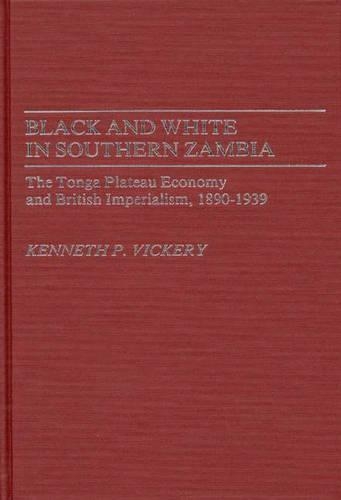
Black and White in Southern Zambia: The Tonga Plateau Economy and British Imperialism, 1890-1939
(Hardback)
Publishing Details
Black and White in Southern Zambia: The Tonga Plateau Economy and British Imperialism, 1890-1939
By (Author) Kenneth Vickery
Bloomsbury Publishing PLC
Praeger Publishers Inc
23rd July 1986
United States
Classifications
Tertiary Education
Non Fiction
330.96894
Physical Properties
Hardback
264
Width 156mm, Height 235mm
567g
Reviews
It is trendy to rush doctoral studies into book publications. In many cases, no follow-up research is undertaken before converting the doctoral study into a book. Within this general trend, Vickery is unique in having made two further trips in order to revise, update and rework some insight of the original study. The collection of field data was a successful combination of historical and anthropological approaches. . . . . .Apart from these problems which Vickery inspired me to raise, this is an important study in peasant studies in Southern Africa. It is insightful in interpretation, sensitivity to social theory and methodology.u-Journal of Sothern African Studies
This book is about economic activity and how it changed from 1890 to 1939 in the Tonga Plateau in present-day Zambia. Archival sources, fieldwork including the gathering of oral history, published sources, and secondary literature were all a part of the preparation of this study. Vickery's command of the literature is impressive. In recounting the history of the region, he attempts to place what happened in the larger context. He suggests the applicability of some economic theories of behavior and rejects other ideas about the role of the African peasant in an imperial economy. ... The differences in attitudes and values between the time before 1918 and today are substantial. What was acceptable behavior toward Africans in the early 1900s is not now. For example, the alienation of the African land by the Europeans would appear wrong to many today. ... The book is a well-written and good account of economic change caused by the presence of Europeans in a small part of Africa. It has notes at the end of each chapter, a bibliography, and an index. While the book is of certain interest to scholars of southern Africa, it has a wider appeal as a study of economic change because of pressure from the outside. Undergraduate and graduate collections.-Choice
"It is trendy to rush doctoral studies into book publications. In many cases, no follow-up research is undertaken before converting the doctoral study into a book. Within this general trend, Vickery is unique in having made two further trips in order to revise, update and rework some insight of the original study. The collection of field data was a successful combination of historical and anthropological approaches. . . . . .Apart from these problems which Vickery inspired me to raise, this is an important study in peasant studies in Southern Africa. It is insightful in interpretation, sensitivity to social theory and methodology.u"-Journal of Sothern African Studies
"This book is about economic activity and how it changed from 1890 to 1939 in the Tonga Plateau in present-day Zambia. Archival sources, fieldwork including the gathering of oral history, published sources, and secondary literature were all a part of the preparation of this study. Vickery's command of the literature is impressive. In recounting the history of the region, he attempts to place what happened in the larger context. He suggests the applicability of some economic theories of behavior and rejects other ideas about the role of the African peasant in an imperial economy. ... The differences in attitudes and values between the time before 1918 and today are substantial. What was acceptable behavior toward Africans in the early 1900s is not now. For example, the alienation of the African land by the Europeans would appear wrong to many today. ... The book is a well-written and good account of economic change caused by the presence of Europeans in a small part of Africa. It has notes at the end of each chapter, a bibliography, and an index. While the book is of certain interest to scholars of southern Africa, it has a wider appeal as a study of economic change because of pressure from the outside. Undergraduate and graduate collections."-Choice
Author Bio
ckery /f Kenneth /i P.
